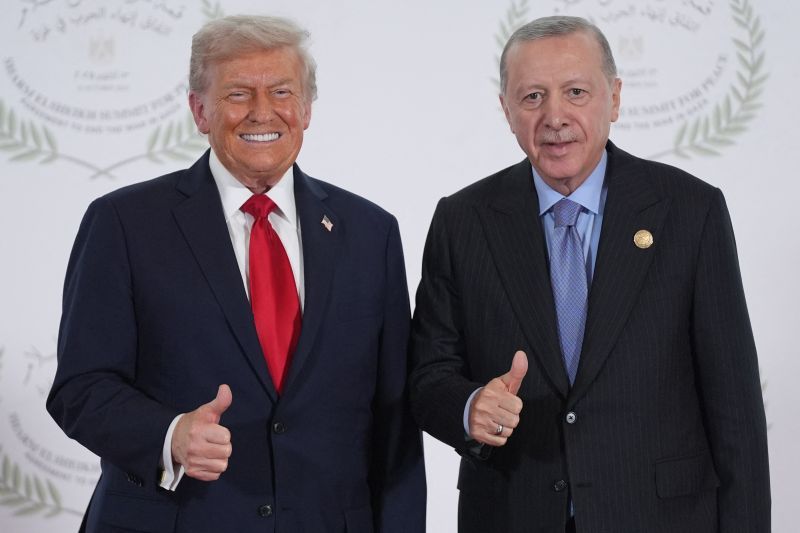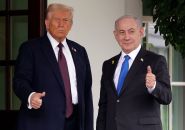- Home
- Middle East
- Trump’s Gaza Plan: Is Erdogan the Other Big Winner?

US President Donald Trump and Turkey's Recep Tayyip Erdogan at Sharm el-Sheikh summit on Gaza ©EVAN VUCCI/POOL/AFP
Long sidelined by the United States on Gaza and in wider regional affairs, Turkey is staging a forceful comeback, driven both by the fall of Syrian President Bashar al-Assad and the Gaza agreement brokered by US President Donald Trump.
Ankara has played a pivotal role as intermediary between Hamas and Washington, helping to persuade the Palestinian movement to accept the American plan. As one of the four signatories, Turkish President Recep Tayyip Erdogan is seizing this opportunity to reclaim a central role in the Middle East and capitalize on his rapprochement with Trump.
A Strategic Rapprochement
According to Reuters, Turkey’s participation in the Gaza negotiations was initially rejected by Israel until Trump personally intervened to ensure Ankara’s inclusion. The Guardian reports that Trump also extended a last-minute invitation to Israeli Prime Minister Benjamin Netanyahu to attend the Gaza summit in Sharm el-Sheikh, Egypt, but Erdogan reportedly made it clear he would not attend if Netanyahu were present. While it remains uncertain whether Erdogan’s stance influenced Netanyahu’s absence, it is evident that the Turkish president now has the ear of the American leader.
Trump has been generous in his praise, describing Erdogan as “one of the most powerful leaders in the world” and “a reliable ally,” adding that “he is always there when I need him.” This renewed closeness marks a notable turnaround for US-Turkish relations, which had deteriorated after Washington imposed sanctions in 2020 over Ankara’s purchase of Russian S-400 defense systems.
Analysts view this development not as an ideological shift but as a calculated strategic alignment. “It is essentially a trade-off of interests: preserving NATO cohesion and increasing pressure on Russia and Iran in return for warmer defense ties with Ankara and a suspension of bilateral disputes,” explained Andreas Krieg, a researcher at King’s College London, in an interview with This is Beirut.
Krieg added that Turkey’s recent rapprochement with key Arab powers, including Egypt, Saudi Arabia and the United Arab Emirates, has also been welcomed by Washington. “Ultimately, the convergence of great power priorities and Ankara’s regional recalibration has led to a pragmatic thaw,” he said.
A Potentially Advantageous Partnership
Leveraging its strengthened position, Turkey aims to secure multiple benefits from its renewed US ties. According to Krieg, these benefits fall into three main areas: security, economic opportunity and regional stature.
“On the security front, Ankara seeks to maintain US tolerance of its red lines in northern Syria while restoring defense cooperation within NATO,” he explains. “The recent agreement for the sale of a batch of F-16 fighter jets worth $23 billion demonstrates that Washington is once again willing to cooperate when Turkey aligns with its priorities, as was the case with Sweden’s NATO accession.”
Economically, Turkish companies are positioning themselves to play a leading role in Gaza’s reconstruction, aiming to benefit from the contracts and financing that will accompany it. “In terms of status, Ankara is seeking a visible role as a guarantor, reinforcing its image as an indispensable regional power capable of managing and resolving crises,” adds Krieg.
An Uncertain Future
It remains unclear whether the Gaza agreement will produce lasting change, and for Erdogan, the real challenge is turning this diplomatic success into tangible results. His immediate priorities in early October focused on securing a comprehensive ceasefire, delivering humanitarian aid and spearheading Gaza’s reconstruction.
A later phase of the plan envisions deploying an international security force in the enclave. On this point, US Vice President JD Vance stated on Tuesday, “We are not looking to impose anything on our Israeli friends regarding foreign troops on their soil, but we believe there is a constructive role that Turkey can play.”
Last week, Turkish Foreign Minister Hakan Fidan said that “if a two-state solution is realized, Turkey would be ready to serve as a de facto guarantor” for the protection of Palestinians. Turkish Defense Minister Yasa Güler echoed this position, announcing on the eve of the Egypt summit that the Turkish army was prepared to participate in “any mission” assigned under the ceasefire framework.
However, according to The Jerusalem Post, Benjamin Netanyahu reportedly told Egypt’s intelligence chief, Hassan Mahmoud Rashad, and Vance that Turkish forces would not be allowed to enter Gaza.
Given the uncertain outlook, it is difficult to speak of a clear victory for Turkey. “If Ankara secures an official role as guarantor or overseer, along with participation in forming a new Palestinian police force, it would be a significant win in terms of access and prestige,” notes Krieg. “Otherwise, it will at most be a limited opportunity: Turkey will remain a key mediator with Hamas’ political leadership and a potential security and economic supporter, but within a framework defined by Washington.”
Still, the Gaza crisis has allowed Turkey to strengthen ties with the United States, reposition itself on the regional stage, and advance other strategic priorities, including Syria and defense contracts.
Read more




Comments